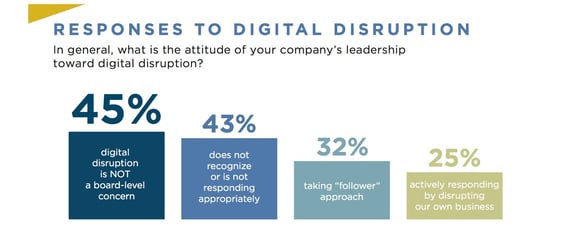The term digital disruption has become so commonly used and adopted by business leaders that many people are starting to see it as a cliché and a misused word. Nonetheless, it's still something business leaders need to acknowledge and react to which takes me to the subject of this blog post where I will share some fascinating statistics from a global survey on how firms respond to digital disruption.

Despite the fact that digital disruption is such a popular term in today's business landscape, 45% of companies surveyed in IMD's and Cisco's report, Digital Vortex: How Digital Disruption Is Redefining Industries, stated that digital disruption is not a board-level concern. Among those companies we can find industries such as hospitality, travel and telecomunications. This is of course very surprising considering that all of those sectors have been affected by disruption. Check out this blog post for an insight into how digital disruption has impacted the hospitality industry - Futurist Keynote: Digital Disruption in the Hospitality Industry.

The data in the graph above are from a report by IMD and Cisco.
As you can see in the graph above, 45% of the surveyed companies do not recognise or is not responding appropriately to digital disruption. In other words, businesses are either not paying attention to the changes impacting their industry or don't have the tools and creative thinking needed to respond effectively.
This report also reveals that as many as 32% of surveyed companies take a "follower approach" as a way to respond to digital disruption.
This report also reveals that as many as 32% of surveyed companies take a "follower approach" as a way to respond to digital disruption. This might sound like a reasonable strategy if you want to avoid the risk of doing nothing or don't want to make the investments needed in order to actively respond to disruption, but the truth is that this is actually a risky strategy because chances are you will not be able to act fast enough.
Only 25% out of the 941 surveyed business leaders stated that they have adopted a proactive strategy and are ready to disrupt their own business as a means to stay competitive.
Business leaders must realise that they need to do more than just a marginal or very small incremental update of their strategies.
These statistics show that many firms are struggling to defend and find their place in today's digitised business landscape. As digital technologies and connecctivity are becoming increasingly ubiquitous in society and are continuing to transform the economy, business leaders must realise that they need to do more than just a marginal or very small incremental update of their strategies. In order to future-proof your business I would argue that you need to update you business and marketing strategy and ensure that it permeates every aspect of your business. I realise that you can't change your business overnight, but already today you can as a first step start re-thinking and re-evaluating your customer experience and customer journey.
Subscribe to our YouTube-channel to access our latest future trendspots now!


